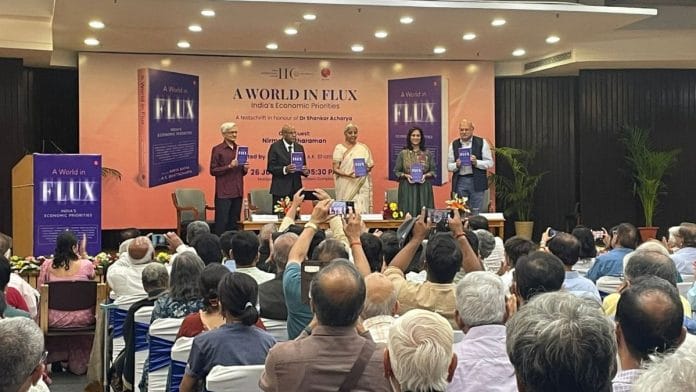New Delhi: Finance Minister Nirmala Sitharaman hinted at a revival of economic ties with China at the launch of a collection of essays from economists and policymakers.
“There are now calls from both sides for access and opening of windows for interaction,” said Sitharaman, acknowledging that steps had been made in the right direction after External Affairs Minister S Jaishankar’s visit to China. “It might help the economy, but a sense of caution would have to be built in.”
Sitharaman was the Chief Guest at the launch of A World in Flux: India’s Economic Priorities, a festschrift in honour of Dr. Shankar Acharya, the former Chief Economic Adviser to the government. Alongside Sitharaman and Acharya were the book’s editors—Amita Batra and AK Bhattacharya—along with former diplomat and contributor to the book Shyam Saran.
“It is important to ask if the old order remains relevant, and if the old needs to be replaced by the new. If so, what should be its defining parameters?” Amita Batra asked a room full of journalists, academics and IIC members in her opening remarks.
Batra went on to speak about the book’s relevance in a world plagued with global conflicts, trade protectionism and interventionist industrial policies. It explores topics ranging from trade and climate change to fiscal policy and digitalisation.
Also read: Deepak Nayyar wants to abolish UGC and end political appointments at universities
India’s economic priorities
The panel discussion shifted closer to home when AK Bhattacharya asked Sitharaman about India’s top three economic priorities. Sitharaman was contemplative before offering broad, macro-level focus areas that she, as the country’s finance minister, was overseeing.
“Maintaining growth is the topmost priority,” said Sitharaman, explaining that each focus area would have overlaps with others. “This will have value addition on jobs and therefore not just impact the GDP (gross domestic product), but also the GVA (gross value added).”
Her second priority was on how India fits into the global jigsaw puzzle, where ‘pieces are getting redefined every minute’. Sitharaman admitted that she was using a simple analogy for a very complex problem, but India needed to be in a leadership position to define the global institutions that would govern the world for the next one hundred years.
“It’s one thing to aspire to be at the table or maintain the growth rate but are we fundamentally giving the economy the necessary support for every section that matters,” said Sitharaman, posing a rhetorical question to the audience before listing her third priority—achieving the country’s domestic economic aspirations and assigning the right resources to them.
Also read: MS Swaminathan’s centenary celebrated in Delhi. ‘A scientist who knew how the govt works’
Growth of bilateral trade
India’s relationship with the global economy took centre stage after Bhattacharya asked Sitharaman about how she viewed investment and trade. Sitharaman first tackled domestic investment, highlighting Prime Minister Narendra Modi’s focus on public spending.
“The numbers are there before you. Every year, it’s the Prime Minister’s clear instruction that you must have capital expenditure grow significantly,” said Sitharaman, adding that she considered this one of the primary drivers of sustained economic growth. “It [growth rate] can be higher, but the level at which it is maintained is largely on the back of public capital expenditure, which is growing every year.”
Sitharaman went on to explain that the government can make sure policies on Foreign Direct Investment (FDI) are “friendly and attractive” to ensure the country is an attractive investment destination. But she pointed out that the private sector could do more.
“Is the Indian private sector investment growing in pace with the public investments,” said Sitharaman, adding that from 2019, once the twin balance sheet problem was addressed and corporate tax was brought down, balance sheets of the corporate sector have become healthier. “But are businesses sitting over passive investable funds.”
On trade, Sitharaman said bilateral trade has taken priority over multilateral trade. In the last five years, India has had agreements with Australia, the UAE and the United Kingdom. “Negotiations are progressing with the United States of America and the European Union,” she added.
Amita Batra concluded the panel discussion by asking Sitharaman if she faced any challenges in multilateral meetings, especially in a world in ‘flux’ where countries were redefining themselves and reassessing allies.
“Conversations are pleasant, no doubt,” said Sitharaman, referring to meetings at the World Bank, IMF and G20. “But what you speak about are difficult things. They are not negotiations yet—it’s mostly setting the table.”
Bhattacharya got the last question in, asking Sitharaman what kept her awake at night.
“I sleep well, actually,” she said, as the room erupted in laughter and light applause.
(Edited by Theres Sudeep)






